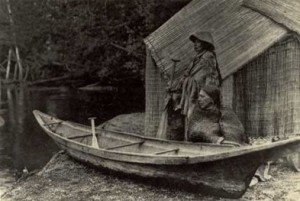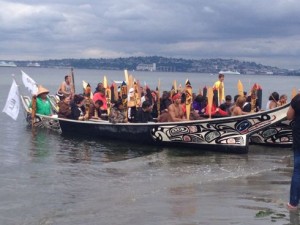Last Thursday, I heard a story on my local public radio station about the “remaking” of Seattle. The host interviewed geology writer David Williams about his book, which details a series of landscape-transforming projects — razing hills, filling in tide flats, and cutting a canal between two lakes — undertaken by white settlers in the late 19th and early 20th centuries. According to Williams, Seattle’s forefathers chose the site for their city based on its useful deep water port, but they found the actual landscape — hilly, and covered with rivers and trees — to be unworkable for their purposes. So, they decided to change it.
During the interview, Mr. Williams described these settlers’ actions as “bold,” “naïve,” and “ambitious.” He even called them insecure, based on his belief that early Seattleites wanted their city to be considered “world class” but weren’t sure it quite measured up.
I paid close attention to Williams’s version of the story, because, only a few weeks earlier, I had seen the documentary Princess Angeline at an event at the Duwamish Longhouse. The film addresses these very same projects, but from the perspective of the Duwamish people, who were the original inhabitants of the land that became Seattle. Far from improving the “habitability” of their homeland, the landscape-altering projects completely destroyed the Duwamish way of life.
But there was not a single mention of the Duwamish people — by Mr. Williams or by the host — in the entire seven-minute interview. There was no talk of violence, greed, or racism, despite the fact that the rivers the Duwamish had used for sustenance and travel for thousands of years were either filled with dirt from the razed hills or poisoned by all of the rapid “progress.” Instead, the interview encouraged listeners to imagine brave, industrious settlers taming an empty (and troublesome) landscape.
This kind of revisionist history, this kind of erasure, happens again and again in the ways we talk about our city — and our country. It reinforces the myth that the United States was founded by pilgrims and pioneers who discovered an empty, resource-rich land and built an exceptional nation. We rarely trouble ourselves with the inconvenient fact that the land was already inhabited when these adventurous, freedom-loving pioneers arrived. Nor do we consider that their descendants continue to live among us.
A couple of weeks ago, I attended a talk by one of my favorite writers, Isabel Wilkerson. Ms. Wilkerson is the author of The Warmth of Other Suns, a history — viewed through three first-person accounts — of the Great Migration of former slaves from the American south to northern cities. The Warmth of Other Suns is easily the greatest work of nonfiction I have ever read, and Wilkerson is an extremely thoughtful and sensitive scholar and writer, attuned to the stories of people who are discounted and marginalized.
And yet, at the end of her talk, she emphasized that each of us in the audience, by virtue of the fact that we were in Seattle, were the descendants of migrants, people who had come from somewhere else in search of a better life. She was doing so to illustrate the parallels between the participants in the Great Migration and immigrants who came from other lands. But her statement involved a basic assumption: that no one in the audience (and by extension, no one in the city) was a descendant of the people who are native to this region.
When we receive — and repeat — these kids of messages, we are reinforcing the idea that Native people either never existed or are a people of the past. It is easier to believe this than to face the truth. But we must face it. We must learn as much as we can about what happened, what was lost, and how we can forge a more just path forward.
So I am beyond pleased that we have decided as a city to honor, celebrate, and especially, to hear the people whose land we now occupy.
Happy holiday, everyone. See you at the celebration?


